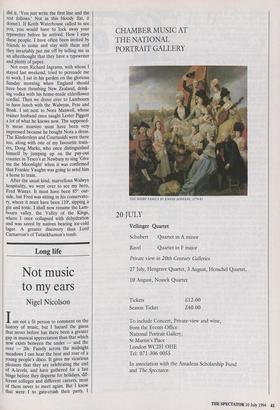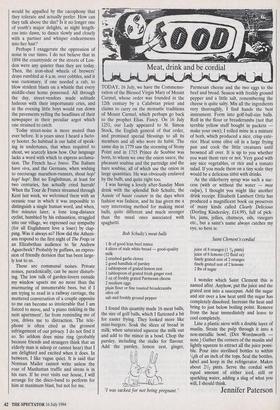Long life
Not music to my ears
Nigel Nicolson
Iam not a fit person to comment on the history of music, but I hazard the guess that never before has there been a greater gap in musical appreciation than that which now exists between the under — and the over — 20s. Faintly across the midnight meadows I can hear the beat and roar of a Young people's disco. It gives me vicarious pleasure that they are celebrating the end of A-levels, and have gathered for a last binge before they disperse for holidays, dif- ferent colleges and different careers, most of them never to meet again. But I know that were I to gate-crash their party, I would be appalled by the cacophony that they tolerate and actually prefer. How can they talk above the din? Is it no longer one of youth's major delights, as night length- ens into dawn, to dance slowly and closely with a partner and whisper endearments into her hair?
Perhaps I exaggerate the oppression of noise in our times. I do not believe that in 1894 the countryside or the streets of Lon- don were any quieter than they are today. Then, the iron-shod wheels of brewers' drays rumbled at 4 a.m. over cobbles, and it was customary, if one needed a cab, to blow strident blasts on a whistle that every middle-class home possessed. All through the day, street-vendors made solitude hideous with their importunate cries, and in the evening little boys would run down the pavements yelling the headlines of their newspaper in their peculiar argot which one strained to catch.
Today street-noise is more muted than ever before. It is years since I heard a facto- ry hooter. So habitual is our habit of speak- ing in undertones, that when required to shout, we scarcely know how. Our language lacks a word with which to express acclama- tion. The French have bravo. The Italians have viva, and the Germans, when wishing to encourage marathon-runners, shout hop! hop! hop!. But no Englishman, at least for two centuries, has actually cried hurrah! When the Tour de France streamed through Kent last week, we welcomed them with an oceanic roar in which it was impossible to distinguish a single human word, and when, five minutes later, a lone long-distance cyclist, humbled by his exhaustion, straggled into our village, we expressed our sympathy (for all Englishmen love a loser) by clap- ping. Was it always so? How did the Atheni- ans respond to the first night of The Frogs or an Elizabethan audience to Sir Andrew Aguecheek? Probably by guffaws, an expres- sion of friendly derision that has been large- ly lost to us.
These are communal noises. Private noises, paradoxically, can be more disturb- ing. The low talk of garden-lovers outside my window upsets me no more than the murmuring of innumerable bees, but if I am trying to read in a railway carriage, the muttered conversation of a couple opposite to me can become so intolerable that I am forced to move, and 'a piano tinkling in the next apartment', far from reminding me of you, drives me to distraction. The tele- phone is often cited as the grossest infringement of our privacy. I do not find it so. So seldom does mine ring (probably because friends and strangers think that an elderly man is asleep or cannot hear) that I am delighted and excited when it does. In between, I like vague quiet. It is said that Norman Mailer cannot write unless the roar of Manhattan traffic and sirens is in his ears. If he ever visits our house, I will arrange for the disco-band to perform for him at maximum blast, but not for me.



















































 Previous page
Previous page